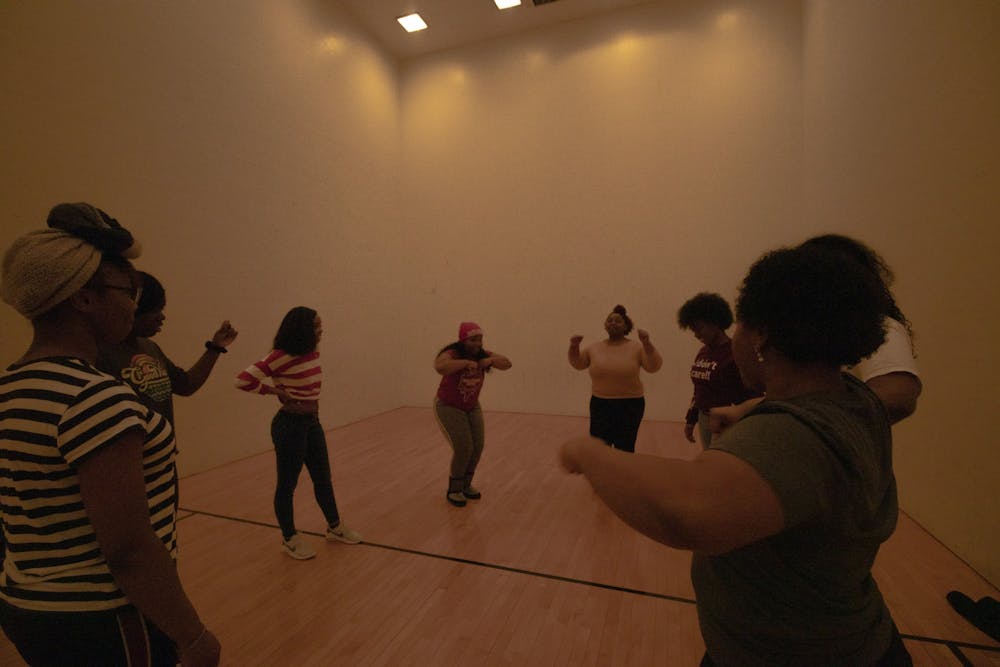This story was updated 9:30 p.m. Feb. 27.
Seen in movies such as “Drumline,” “School Daze” and “Stomp the Yard,” stepping has been part of black culture in America since the 20th century, according to Step Afrika!’s website. IU’s first step team, called L.E.G.A.C.Y, was created on campus this school year.
“Since we don’t have a step team at IU, I felt I had a responsibility to start one,” junior and co-founder Arie Martin said. “Cultural dances are essential in keeping a culture together.”
Stepping rich is a form of percussive dance that is a mixture of footsteps, call-and-response and hand claps, according to a July 2008 article on Ausdance’s website. While stepping requires participants to create rhythmic sounds with their bodies, strolling is a form of stepping that is done to music.
Stepping has origins in African foot dance and has been used as communication and entertainment. Slaves used a form of stepping to communicate with each other when they weren't allowed to talk.
“It’s a form of art that is used with your body to make a rhythm that corresponds with a beat,” Martin said. “It’s not only creative but keeps us connected to our roots.”
Stepping at IU has usually been reserved for the National Pan-Hellenic Council fraternities and sororities. IU NPHC organizations compete in an annual strolling competition called Stroll Fest. Additionally, the Kappa Alpha Psi fraternity has a fundraiser called Shimmy Grams, and members step for recipients of the gram.
Martin said the L.E.G.A.C.Y step team wants to set itself apart from the idea that stepping is only for NPHC organizations.
“We are not doing it with a specific organization attached to us, and we don’t use the hand signs or signature moves of the NPHC fraternities and sororities,” Martin said. “We do it for the love, fun and hard work.”
Stepping is popular at many historically black colleges and universities. For example, at Howard University in Washington, D.C., some teams represent residence halls, and one represents the university. While prevalent at HBCUs across the country, there are no reports of a step team at IU until now.
“I hope that our team will bring a sense of home and culture to the black community at IU,” freshman and co-founder Makailah Govan said.
NPHC step teams have signature moves, symbols and traditions associated with their stepping, but the L.E.G.A.C.Y step team must rely on its members’ imaginations to put routines together.
“I always have material in my head,” Govan said. “Most of my inspiration comes from everything around me.”
One aspect of stepping that the team hopes to incorporate soon is competition, Martin said. While there aren’t any other teams on campus to compete with, the team is looking to compete against other schools’ teams. Govan said Indiana State University has a good step team, and the rivalry between IU and ISU would add to the excitement of a competition.
While typically associated with black culture, the team is open to all IU students. This collaborative style helps bring more diversity and influence to the routines, L.E.G.A.C.Y executive board member Madeline Tanner said.
“It’s helped broaden my horizon,” she said. “It’s very different from what I’ve done in high school. I come from a tap dancing background, and I think it’s really cool to see where the styles collide.
When any type of cultural expression is introduced to an outsider of that community, there is a risk of appropriation and inauthenticity, Martin said. This is especially true when bringing a traditionally black form of expression to a campus where, in 2019, 5.1% of the student population was black.
However, Martin said the group is not meant to be exclusionary.
“I want people to view step as they view the cha-cha-slide,” Martin said. “I want people to see it as inviting, informal and something that can bring a community together.”
Update: This story was updated to remove the time and date of the L.E.G.A.C.Y step team's first showcase. The team does not yet have a new time or venue.
CORRECTION: A previous version of this story incorrectly spelled Arie Martin's name and Makailah Govan's name. The IDS regrets these errors.




